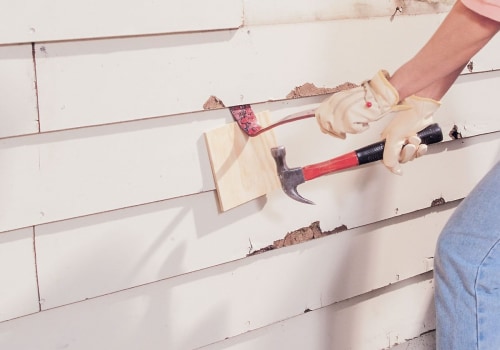Are you considering getting new siding for your home? If so, you may have come across the term 'necessary repairs or prep work' in your research. But what exactly does this mean and how much can you expect it to cost? In this article, we will delve into the world of siding and break down the cost of necessary repairs or prep work near Ladson SC. Whether you're looking to replace your old siding or just want to understand the additional expenses that come with it, this article is for you. So, let's dive in and gain a better understanding of what to expect when it comes to the cost of Siding Repair near Ladson SC, including necessary repairs or prep work. When it comes to choosing the right siding for your home near Ladson SC, there are several options available in the market such as vinyl, fiber cement, wood, and more. Each type has its own benefits and drawbacks, and it's important to consider these before making a decision.
For example, vinyl siding is low maintenance and cost-effective, while wood siding gives a more natural and traditional look to your home. However, keep in mind that the cost of necessary repairs or prep work may vary depending on the type of siding you choose. To accurately estimate the cost of necessary repairs or prep work, it's important to take into account factors such as the size of your home, the condition of the existing siding, and any additional features you may want to add. For example, if your home has multiple stories or unique architectural features, it may require more time and materials for installation or repair. It's also important to consider the labor costs associated with siding installation or repair. Hiring a professional siding company can save you time and ensure quality work, but it may come at a higher cost compared to DIY projects. Additionally, keep in mind that there may be additional expenses that arise during siding installation or repair, such as the cost of removing old siding, repairing any underlying damage, or adding insulation.
Make sure to discuss these potential expenses with your chosen siding company and factor them into your budget. Overall, understanding the cost of necessary repairs or prep work for siding is crucial in making an informed decision and avoiding any unexpected expenses. It's always best to consult with a professional siding company to get an accurate estimate and ensure a successful and long-lasting installation or repair.
Choosing the Right Siding for Your Home
When it comes to choosing the right siding for your home, there are several factors that you should consider. These factors will not only affect the overall cost of your siding project, but also the longevity and maintenance of your siding. Here are some key things to keep in mind:- Material: The type of material you choose for your siding will have a significant impact on the cost.
Some popular options include vinyl, wood, and fiber cement. While vinyl is typically the most affordable, wood and fiber cement can offer more durability and a higher-end look.
- Climate: Consider the climate in your area when choosing your siding. Certain materials may be better suited for harsher weather conditions, while others may not hold up as well.
- Style: Different types of siding can give your home a different aesthetic. Be sure to choose a style that complements your home's architecture and fits in with the surrounding homes in your neighborhood.
- Maintenance: Some types of siding require more maintenance than others.
Be sure to factor in the cost of upkeep when deciding on the right option for your home.
Additional Expenses to Consider
As a siding company, it's important to understand the potential additional expenses that may arise during siding installation or repair. These costs can add up quickly and significantly impact the overall cost of the project. It's essential to factor in these expenses when providing estimates to clients to ensure transparency and avoid any surprises. One common additional expense is the cost of removing and disposing of old siding.Depending on the type of siding being replaced, this can be a time-consuming and labor-intensive process. The cost will vary depending on the size of the home and the amount of siding that needs to be removed. Another potential expense is the need for additional materials. For example, if there is significant damage to the underlying structure or if certain areas need to be reinforced before installing new siding, this will require extra materials and labor, which can increase the overall cost. Weather can also play a significant role in additional expenses. If there is unexpected inclement weather during the installation process, it may delay the project and result in additional costs for labor and materials.
It's important to have a contingency plan in place for such situations. Finally, unforeseen issues may arise during the installation or repair process that can result in additional expenses. For example, if there is mold or rot discovered under the old siding, this will need to be addressed before new siding can be installed.
It's crucial to communicate these potential additional expenses with clients and have them included in the initial estimate to avoid any misunderstandings or conflicts later on. By being transparent about these costs from the beginning, you can build trust with your clients and ensure a smooth and successful project.
Estimating the Cost of Necessary Repairs or Prep Work
When it comes to estimating the cost of necessary repairs or prep work for siding, there are several key factors to consider. These factors can greatly impact the overall cost of the project, so it's important to understand them before getting started. One of the biggest factors to consider is the type of siding being used.Different types of siding have different costs, with some being more expensive than others. For example, vinyl siding tends to be one of the most affordable options, while wood siding can be significantly more expensive. The size of the repair or prep work needed is another important factor. The larger the area that needs to be repaired or prepped, the more materials and labor will be required, which can increase the overall cost. The condition of the existing siding is also a key consideration. If the current siding is in poor condition and needs to be completely replaced, this can significantly add to the cost.
On the other hand, if only minor repairs or touch-ups are needed, the cost may be lower. Other factors that can impact the cost include any additional features or customizations, such as trim or decorative accents. These details can add to the overall cost but can also enhance the appearance and value of your home. It's important to keep in mind that every home and siding project is unique, so the cost of necessary repairs or prep work will vary. Consulting with a professional siding company can help you get a more accurate estimate based on your specific needs and preferences.
The Importance of Hiring a Professional Siding Company
When it comes to the cost of necessary repairs or prep work for siding, hiring a professional siding company is crucial. While some homeowners may attempt to save money by doing the work themselves, this can often lead to more expensive repairs in the long run.A professional siding company has the experience, knowledge, and tools to properly install or repair siding, ensuring that it is done correctly and efficiently. One of the main reasons why it's important to hire a professional siding company is for their expertise. Siding installation and repair can be a complex process, involving precise measurements, cutting, and fitting. A professional siding company will have the necessary skills and experience to handle any challenges that may arise during the project. Additionally, hiring a professional siding company can save you time and stress. Without the proper knowledge and experience, DIY siding projects can take much longer than expected and may not turn out as desired.
By hiring professionals, you can trust that the job will be done efficiently and effectively, allowing you to focus on other important tasks. Safety is another important factor to consider when it comes to siding installation or repair. Professionals have the necessary training and equipment to ensure that the job is done safely and without any accidents. They also have insurance in case of any unforeseen damages or injuries. Lastly, a professional siding company can help you save money in the long run. While it may seem cheaper to do the work yourself, mistakes or improper installation can lead to costly repairs down the line.
By hiring professionals, you can avoid these expenses and have peace of mind knowing that the job was done right the first time. By understanding the factors that go into determining the cost of necessary repairs or prep work for siding, you can make an informed decision and avoid any unexpected expenses. Remember to consider the type of siding, the size and condition of your home, labor costs, and potential additional expenses. And always consult with a professional siding company for an accurate estimate and quality work.





